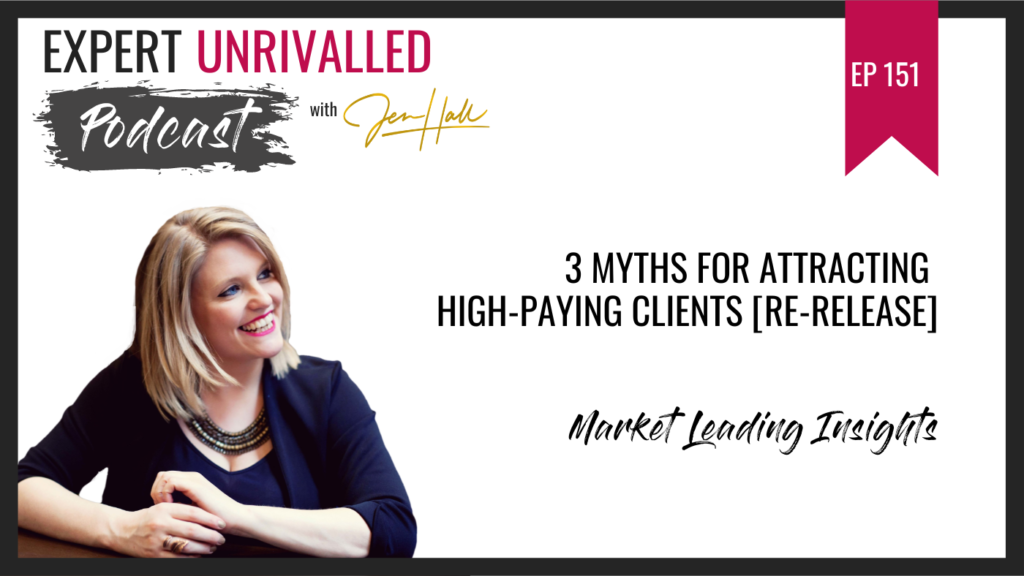It’s not as hard as you think to sell high ticket offers and find clients who are willing to spend large sums. Most of the time the block to finding high-paying clients is in our misconceptions and poor marketing.
In this episode, I’m busting three common myths around high-paying clients so you can start attracting committed high-paying clients with ease!
Listen to the episode on the player above or read the blog below
3 Myths about high-paying clients
Many of us are wondering how we go about attracting high-paying clients. And it is one of the biggest reasons that clients join my Elevate programme. They want to improve their positioning to get in front of their ideal clients.
High-ticket clients mean you can invest money back into your business but you also work very closely with these clients. Working 1-1 with high-paying clients means that you can get more feedback from them, and understand the transformation you’re making and the results your clients are getting. Then you can apply this to selling one-to-many.
It takes the same energy to sell high-ticket as it does low-price. Selling high-ticket can be a great strategy. And a really rewarding way to work. Working one-to-one is a joy. Although there comes a time in your business when you need to scale. Equally, selling high ticket does not need to be one-to-one. Plus you can scale a high-ticket model.
MYTH 1: High-paying clients are extremely wealthy
This is not about people who have tons of money. It is about people who are willing to find money and people who are willing to spend it. There are people who have money and are unwilling to spend it. Equally, there are people who will work to find ways to get the money they need to invest.
I do want to clarify that I do not condone telling people to take out loans or put the money on a credit card. To be transparent, when I started out, I took out loans to pay and reinvest back into myself. As business owners, we should not tell people what to do with their money. It is also not my business to tell people what not to do.
I am glad I invested my money in certain things and it was repaid. But it is none of your business how much money someone has.
People buy a high-ticket service if they have a big problem that they need to solve. Or they have a big ambition that they will do anything to get. It is the driving force and passion to make it work.
You do not need to look for people who are super-wealthy. They may be wealthy, especially if you are tapping into the luxury market. But it is a myth to say all high-paying clients are wealthy.
People do not like being sold to
When you book a Clarity Call with me, I ask before the call to find out if you have money and want to invest. There is a check box to say if you don’t want to invest and many people tick this box. I take the call and address this immediately. Not everyone makes a decision on the call. Or I send them away as they are not ready to invest.
When I speak to people who have ticked that box saying they do not want to invest it is usually because people love to buy, they hate being sold to. They tick the box as protection.
You should not assume people’s financial position, even when they tell you.
If your service solves their problem, most people will find the money as they understand the return on investment. And that return on investment does not always need to be money.
MYTH 2: You have to provide a luxury service
Depending on your ideal client, they may expect a luxury experience. But you do not necessarily need to provide a luxury service.
People want to solve their big problems or achieve a goal. Luxury is the cherry on top but it is not why they are buying. Unless your ideal client values luxury.
I work with a lifestylist who works with women in the luxury market. She works with luxury brands and her ideal client puts luxury on a pedestal. Equally, I work with people who run high-ticket programmes who don’t expect luxury, they want to solve their problems.
MYTH 3: Your ideal client is ahead in the game
This is a grey area. There is an element of truth to this – if you catch someone too soon in terms of mindset and commitment then they are not in the position to pay a high-ticket sum. However, being new does not mean they are not in the position for a high-ticket service.
It is about how much they want it and their determination. They are committed and ambitious. And they are willing to do whatever it takes to make it happen and get the return on the investment. This is the kind of client you are after – regardless of your industry.
It is not true that your client will always be more advanced. It is more about how much they want to reach their goal.
Final thoughts
High-ticket can be rewarding. You don’t have to sell high-ticket to feel like you are making an impact. It is about you, your ideal client, who you want to serve, and what you want. Listen to the pros and cons on this episode here.
It might be about exploring this. If you have a larger audience, you can do a low-ticket entry point and upsell them. If you have a smaller audience, you might as well go straight for that high ticket. Your messaging changes depending on this entry point.
Whether you are looking to sell low or high-ticket, you are reading this because you want to be the number 1 expert in your industry. It is my job to find you the best strategy to achieve this. Book your Clarity Call here.

